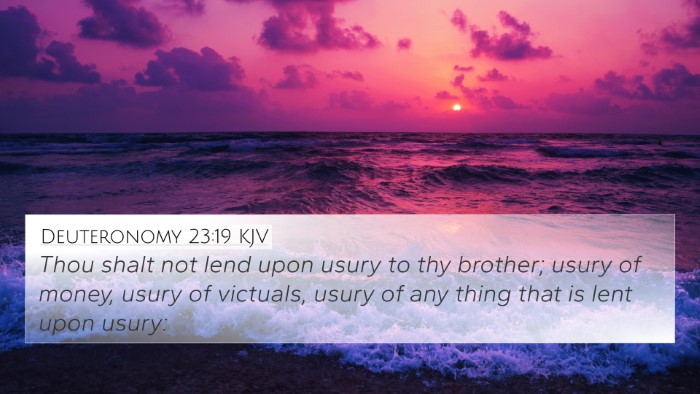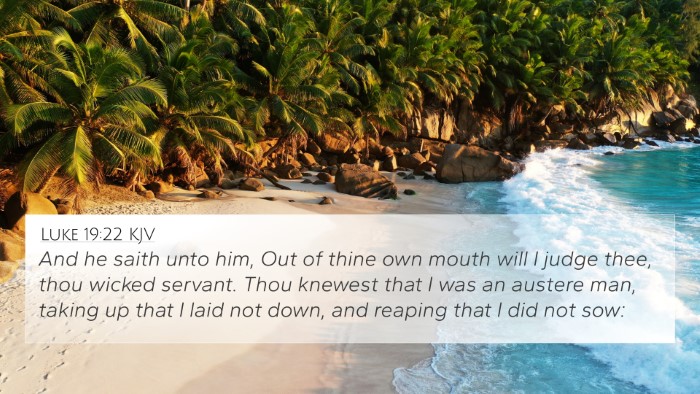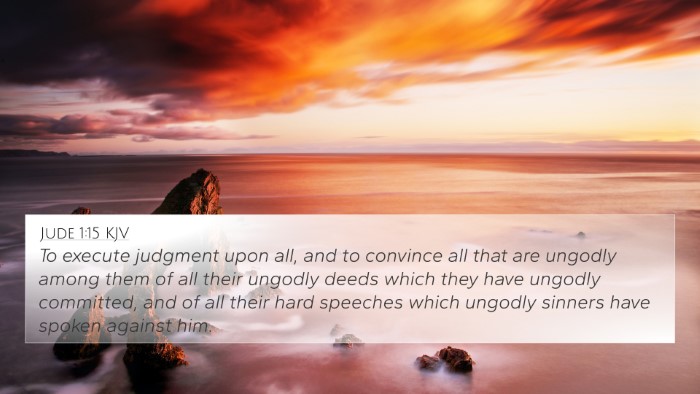Understanding Matthew 25:27
Matthew 25:27 states: "You ought to have deposited my money with the bankers, and at my coming I should have received what was my own with interest." This verse is part of the Parable of the Talents, which teaches valuable lessons about responsibility, stewardship, and accountability.
Verse Meaning and Interpretation
The essence of Matthew 25:27 is a rebuke directed toward the servant who failed to invest his master's talents. The master's expectation was for the servant to actively engage with what was entrusted to him, fostering growth. This notion can be elaborated through insights from renowned commentators:
- Matthew Henry: Henry emphasizes that the master’s expectation demonstrates God's desire for His people to actively use and benefit from their gifts. By failing to invest the talent, the servant showed negligence and a lack of understanding of his master's nature.
- Albert Barnes: Barnes highlights that the master's reprimand illustrates the principle that we are accountable for what we have been given. The failure to take action with the resources entrusted to us is viewed as a significant error in judgment. He suggests that believers are challenged to utilize their God-given abilities for the benefit of God’s Kingdom.
- Adam Clarke: Clarke draws attention to the cultural context regarding banking and investment during biblical times. He posits that even a modest effort, such as depositing funds with bankers, would have sufficed to generate some return. This serves to underline the seriousness of the servant's inaction.
Connections to Other Bible Verses
Matthew 25:27 resonates with and is echoed in numerous other Bible passages, forming a network of scriptural cross-references:
- 1 Peter 4:10: “As each has received a gift, use it to serve one another, as good stewards of God’s varied grace.” This verse reinforces the idea of stewardship similar to that in Matthew 25:27.
- Luke 19:23: “Why then did you not put my money in the bank, and at my coming I might have engaged it with interest?” This verse mirrors the message of Matthew 25:27, emphasizing the expectation of returns on investments made.
- Ecclesiastes 11:1: “Cast your bread upon the waters, for you will find it after many days.” Similar to the principle of investing in Matthew 25:27, it encourages taking opportunities to yield a return.
- James 1:22: “But be doers of the word, and not hearers only, deceiving yourselves.” This encourages active application, paralleling the call for the servant to act upon his master's demands.
- Luke 12:48: “Everyone to whom much was given, of him much will be required.” This verse echoes the theme of accountability for the gifts and resources given to us, mirroring the lessons from the Parable of the Talents.
- Romans 12:6-8: “Having gifts that differ according to the grace given to us, let us use them...” Here, Paul encourages active engagement with one’s spiritual gifts, akin to the responsibility highlighted in Matthew 25:27.
- Galatians 6:7-8: “For whatever one sows, that will he also reap.” This principle of investment and returns is foundational to both the parable and this verse.
Thematic Connections
Several thematic connections arise in the study of Matthew 25:27:
- Stewardship: This theme is pervasive throughout the Bible, emphasizing the importance of responsibly managing what has been entrusted to us.
- Accountability: Scripture repeatedly reflects the idea that individuals will be held accountable for their actions concerning the gifts and resources provided to them.
- Risk and Reward: The principle of stepping out in faith with what we've been given is a recurring motif in biblical narratives.
- Faithfulness: This verse calls believers to be faithful in their tasks, echoing the call to serve diligently in various parts of Scripture.
Applying the Verse in Life
To apply the lessons from Matthew 25:27, consider the following:
- Assess Your Gifts: Reflect on what abilities, resources, and opportunities God has given you.
- Invest Wisely: Seek ways to actively use your gifts, whether through service, evangelism, or community engagement.
- Evaluate Your Actions: Regularly contemplate how you are utilizing what God has entrusted to you and make necessary adjustments.
Conclusion
In summary, Matthew 25:27 provides profound insights into stewardship and accountability. By employing tools for Bible cross-referencing, one can see how this verse connects to broader biblical themes and teachings. Understanding the connections between Bible verses not only enhances our comprehension but enriches our spiritual growth and encourages deeper engagement with the Word. As we cultivate a habit of cross-referencing biblical texts, we lay a foundation for richer theological understanding and a more robust application of scripture in our lives.






